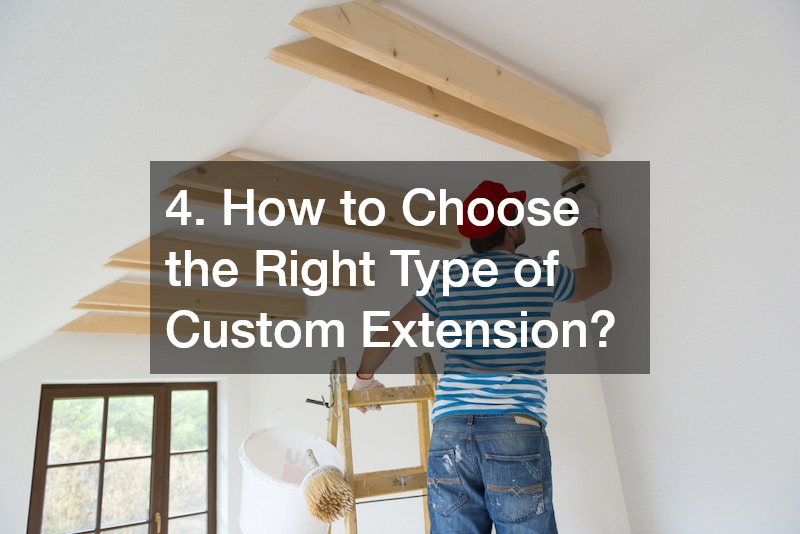In today’s competitive real estate market, homeowners are constantly seeking ways to increase the value of their properties. Custom home extensions offer a unique opportunity not only to expand living space but also to enhance the overall appeal of a home. These well-planned additions can transform a stagnant property into a fresh, dynamic living space that attracts potential buyers and adds substantial worth. Custom home extensions, when executed thoughtfully, provide a personalized touch that resonates with both homeowners and appraisers, making this investment particularly appealing. Beyond aesthetics, these extensions significantly improve functionality, allowing for better space utilization and increased comfort. By integrating modern amenities and energy-efficient solutions, custom home extensions can become a sustainable long-term asset, ensuring an optimal return on investment. Emphasizing quality over quantity, the real power of these extensions lies in careful planning and execution that enhances both property value and living experience.
1. What are Custom Home Extensions?

Custom home extensions are uniquely designed additions to an existing property that cater to the specific needs and desires of homeowners. Unlike conventional additions, custom home extensions are tailored to fit seamlessly with the existing architecture, enhancing both functionality and aesthetics. Properties with these specialized additions often see a notable increase in their market value and appeal.
These extensions can range from adding new rooms, expanding existing spaces, or even creating entirely new living areas such as sunrooms or additional floors. The primary focus is to create a harmonious balance between the old and the new, ensuring that the extension looks and feels like it was always part of the original home. Enhancing living space through custom home extensions also plays a crucial role in improving home heating by allowing more efficient distribution of heat throughout the newly designed spaces.
Incorporating sustainable design principles and modern technologies into these extensions can greatly enhance their functionality. By working with skilled professionals like siding contractors and HVAC companies, homeowners can ensure that their custom home extensions meet both their practical and aesthetic requirements. Ultimately, these personalized extensions contribute to a higher standard of living and can significantly appreciate the value of the property.
2. How Do Custom Home Extensions Increase Property Value?
Custom home extensions provide a strategic approach to increasing a property’s value by substantially enhancing its livable space and functionality. More living space means added amenities, such as an extra bedroom, home office, or entertainment area, which can make a significant difference in a property’s market appeal. Being able to advertise a home with more rooms than comparable properties in the neighborhood is a considerable advantage.
Moreover, a well-executed extension can improve the overall efficiency of a home, making it more attractive to energy-conscious buyers. Upgrading areas of the home with new windows or energy-efficient systems can further elevate the property’s desirability. Consulting with experienced siding contractors to choose the right materials can also boost the exterior appeal of your home, contributing to an increased market presence and value.
In terms of financial return, investing in custom home extensions often results in a higher appraisal value when selling the property. Buyers perceive these homes as having better living conditions and more space, which translates directly into monetary worth. Ensuring that these extensions are aligned with current market trends and buyer preferences is crucial in maximizing this investment.
3. What are the Key Considerations Before Planning an Extension?
Before embarking on a custom home extension project, it is essential to thoroughly assess the potential impact on both the existing structure and the surrounding environment. Key considerations include understanding the structural limitations of the current build and ensuring that the planned extension will not compromise the integrity or safety of the home. Collaborating with professionals like an excavating team can help assess the feasibility of the project in terms of space and foundation.
Additionally, zoning laws and building codes must be closely examined and adhered to, as these regulations can significantly impact the scope and design of the project. Homeowners should obtain the necessary permits and approvals to avoid legal pitfalls and ensure the project progresses smoothly. This step is crucial in preventing costly delays and ensuring compliance with local regulations.
Financial planning is another critical aspect to consider before proceeding with custom home extensions. Creating a detailed budget that accounts for everything from materials and labor to unforeseen expenses is vital. Consulting with contractors, such as a masonry contractor experienced in similar projects, can provide accurate cost estimates and help establish a realistic budget that aligns with the homeowner’s financial capabilities.
4. How to Choose the Right Type of Custom Extension?

Choosing the right type of custom extension involves understanding both the current needs of the household and potential future requirements. Homeowners must first determine the primary purpose of the extension to ensure its practicality and usage will bring value. Whether it’s an additional bedroom, a home office, or a larger kitchen, the specific purpose will guide important architectural decisions.
Another crucial factor is the integration with the existing home structure to maintain a cohesive architectural style. The extension should feel like a natural part of the home rather than an afterthought, ensuring that both the exterior and interior remain harmonious. An HVAC company can help in planning the right climate control systems, crucial for new spaces where temperature regulation is key.
Lastly, evaluating the resale value that different types of extensions might offer is important. By focusing on extensions with broad appeal, such as additional bathrooms or family rooms, homeowners can ensure that their investment will not only meet personal needs but also attract potential buyers in the future.
5. What Design Elements Maximize Space and Usability?
Effective design is at the heart of maximizing space and usability in custom home extensions. One of the most powerful design elements is open-plan layouts, which can enhance functionality and create the illusion of a larger, more interconnected space. This approach eliminates unnecessary walls and barriers, making the home feel more spacious and fluid.
Additionally, strategic use of natural light can dramatically transform the usability and atmosphere of any extension. Large windows or skylights can flood the new space with light, making it more inviting and energy-efficient. Teaming up with a hardscaping company can also add outdoor elements that seamlessly integrate with the indoor areas, providing functional extensions to living spaces.
Functional storage solutions integrated into the design also greatly enhance usability without compromising aesthetics. Built-in shelves, multi-purpose furniture, and creative storage nooks allow for organized spaces that meet everyday needs. These design elements not only improve the practical use of the space but also contribute to an overall increase in property value.
6. How to Budget for Custom Home Extensions?
Budgeting for custom home extensions requires a comprehensive approach that considers both anticipated and unforeseen expenses. The first step is obtaining detailed estimates from contractors for labor and materials and accounting for different phases of the project. A masonry contractor, for example, can provide an accurate cost estimate for building materials and specialized labor required.
Additionally, including a contingency fund for unexpected costs is crucial in any renovation project. This fund helps cushion the impact of unforeseen issues or changes to the original plan, which are common in construction projects. Seasoned homeowners typically allocate a percentage of the budget for these potential overruns to ensure financial preparedness.
Finally, exploring financing options can help homeowners manage the cost of their custom home extension projects. This involves investigating whether home improvement loans, lines of credit, or personal savings are the best option given the financial circumstances. A well-organized budget not only helps in keeping the project on track but also prevents unnecessary financial strain throughout the renovation.
7. What are the Most Common Mistakes in Home Extensions?

One of the most common mistakes in custom home extensions is underestimating the project’s complexity and scale, leading to inefficiencies and increased costs. Homeowners may try to cut corners by hiring inexperienced contractors, but this approach often results in inferior workmanship and costly errors. Engaging a reputable paving contractor can help ensure foundations are sound and durable, preventing future issues.
Neglecting proper communication among stakeholders, including architects, contractors, and specialists, can also lead to misunderstandings and a mismatch in project expectations. Regular updates and clear instructions are vital for maintaining a smooth workflow and achieving the desired outcome. Establishing a clear channel of communication from the outset supports collaboration and cohesion across all team members.
Additionally, failing to anticipate and prepare for disruptions to everyday life can cause frustration and dissatisfaction with the process. Adjusting daily routines, protecting valuables, and considering temporary accommodations can help mitigate the impact of construction on household activities. These preparations are integral to maintaining peace of mind during the renovation.
8. How to Ensure Sustainable and Eco-friendly Extensions?
Sustainability should be at the forefront of any custom home extension project, with an emphasis on eco-friendly materials and practices. Selecting sustainable building materials, such as recycled wood or locally-sourced stone, reduces the ecological footprint of the project. Roofing services utilizing eco-friendly materials can significantly enhance the extension’s energy efficiency and sustainability credentials.
Incorporating energy-efficient solutions and technologies, like solar panels or high-performance insulation, also contributes to long-term sustainability and cost savings. These green investments not only minimize energy consumption but also enhance comfort and appeal to eco-conscious buyers. Considering these factors early in the design process allows for seamless integration into the overall structure.
Furthermore, designing extensions to optimize natural light and airflow reduces reliance on artificial lighting and temperature control systems, thereby promoting energy efficiency. Partnering with contractors experienced in sustainable practices ensures that the extension aligns with environmental goals while adding lasting value to the property.
9. How to Choose the Right Contractor for Custom Extensions?
Selecting the right contractor is crucial to the success of any custom home extension project. One of the first steps is verifying the credentials and certifications of potential contractors to ensure they have the necessary expertise and experience. Referrals and reviews from past clients provide valuable insights into their professionalism and quality of work.
It is also essential to inquire about the contractor’s familiarity with local building codes and regulations. Contractors with extensive experience, such as driveway contractors, can navigate these complexities adeptly, ensuring compliance and preventing costly legal issues. Moreover, ensuring that the contractor has relevant insurance coverage protects homeowners from potential liabilities during the project.
Lastly, transparent communication and a clear agreement are imperative for avoiding misunderstandings and ensuring that all parties are aligned on the project’s objectives. Detailed contracts outlining the scope, timeline, and costs help establish trust and set clear expectations. Choosing a contractor who prioritizes communication and integrity is fundamental to achieving the desired result.
10. What Future Home Trends Should Be Considered?

The landscape of home design and customization is ever-evolving, with new trends continuously emerging. One such trend is the shift towards multifunctional spaces, where rooms can adapt to changing needs and accommodate diverse activities. Homeowners are increasingly prioritizing flexible designs that maximize utility and comfort, making modern lifestyle demands easier to meet.
Moreover, technology integration plays a growing role in new home extensions, with smart home systems increasingly in demand. Including the expertise of plumbing services can ensure the seamless integration of advanced systems and modifications, such as smart faucets or automated heating controls. These technologies elevate convenience while enhancing the home’s modern appeal.
Finally, the desire for sustainable living practices is driving the incorporation of eco-friendly designs and materials. Future-forward homeowners are adopting green solutions that emphasize energy efficiency and conservation. This trend not only boosts property value but also aligns with increasing buyer preferences for environmentally conscious homes.
Custom home extensions are a valuable investment for homeowners looking to enhance their property’s worth and functionality. Through thoughtful planning and execution, these additions create dynamic living spaces that resonate with both current residents and future buyers. By considering factors such as design, sustainability, and budget, homeowners can ensure that their custom home extensions contribute lasting value. Prioritizing quality materials and experienced professionals is key to achieving a successful extension that integrates seamlessly with the existing structure. In the long term, well-planned custom home extensions not only elevate property value but transform the way people live and experience their homes.


